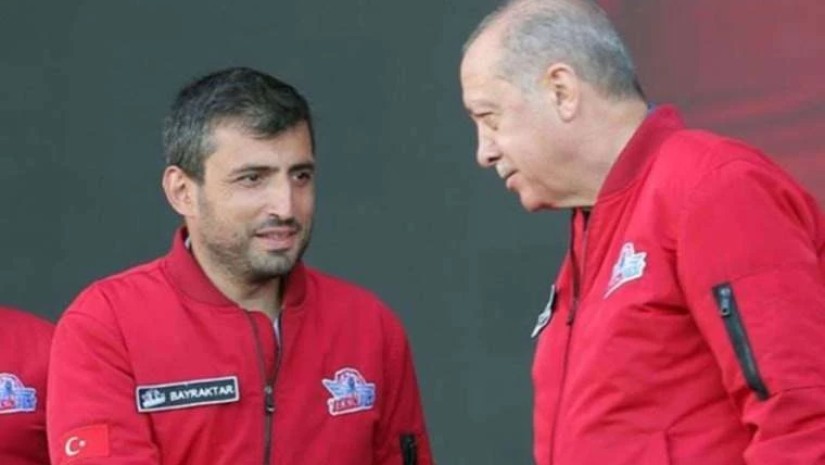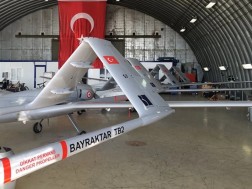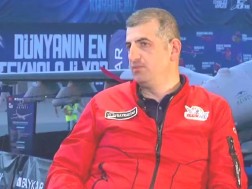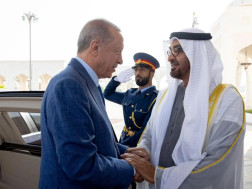As Turkey’s elite flying squad drew the crescent and star of the national flag across Ankara’s sky, Turks on the ground raced for a picture with Selcuk Bayraktar — the man they call a hero for turning the Middle Eastern country into a key global supplier of deadly combat drones.
Bayraktar is also the son-in-law of President Recep Tayyip Erdogan, and there on the tarmac of a military base, his company Baykar displayed its new generation of unmanned combat aircraft — which will fly faster and farther, while carrying more weapons than its existing ones.
The new generation of drones reflect the growing ambitions of a company which has grown increasingly powerful overseas after Ukraine used its TB2 drones to fight Russian forces with substantial effect.
In recent years, Baykar has become a key part of Erdogan’s drive to build a self-sufficient defense industry with products ranging from armed drones to fighter jets and warships. They are all meant to back his increasingly assertive foreign policy in a region mired with conflict. But since Russia’s invasion of Ukraine, overseas sales of the drones have also risen steadily, giving Turkey greater political sway well beyond the Middle East.
In a rare interview at the air-force base on the outskirts of Ankara, Bayraktar, an alumni of the Massachusetts Institute of Technolo-gy, laid out ambitions to expand the company’s capabilities and international sales even further in an effort to boost Turkey’s heft overseas. Baykar will soon start mass-producing at least one of two advanced drones that will take off from Turkey’s newly-built mini aircraft carrier, the TCG Anadolu. At the same time, it’s seeking to expand its share in markets from Africa to Europe and Asia with existing TB2 and Akinci unmanned combat vehicles as well as the newly developed TB3 and Kizilelma.
The new drones will “revolutionize Turkey’s military influence from the Black Sea and the Caucasus to the eastern Mediterranean and the shores of North Africa,” said Bayraktar, who holds the title of chief technology officer at the company, which was founded by his father and controlled by his family. They will “enable Turkey to conduct surveillance and pinpoint attacks over continents thanks to the increase in their flight time and operation radius.”
Baykar says it sells its flagship TB2 plane in 31 countries. While those sales were mostly to developing nations, it’s a jump from just two overseas buyers four years ago. “Sales of the TB-2 have grown rapidly in the past few years,” said Pieter Wezeman, a senior researcher with the Stockholm International Peace Research Institute, or SIPRI. “One after the other country is ordering batches of varying sizes.”
Turkey’s use of drones highlights the changing face of war in one of the world’s most volatile regions. Unmanned aerial vehicles turned the tide in Ankara’s decades-old counterinsurgency against the separatist Kurdistan Workers’ Party in the country’s southeast, northern Iraq, and Syria.
Relatively cheap to make and deploy, the aircraft have in recent years helped swing conflicts in places as far afield as Azerbaijan and Libya in favor of Turkish allies.
Even beyond the Middle East, Turkish drones are likely to be particularly valuable for countries operating outside of NATO or unable to obtain them from the US or Israel for political or financial reasons. The new drones will augment the nation’s reputation as a supplier of high-quality war tech at affordable prices, a unique position that Turkey holds among a handful of countries producing sophisticated drones, according to Fabian Hinz, a defense expert at the International Institute for Strategic Studies in London.
“No matter whether you are a US ally or have problems with the US, you can buy [Turkish drones] at almost no political cost,” Hinz said. “Turkey also seems to be more open to some transfer of technology and to enabling local license production, something which other producers are much more reluctant to do.”
The company made 82 percent of its profits from exports over the past two decades, Bayraktar said, adding the production capacity was increased 50 percent over the past year.
Bayraktar faces plenty of challenges in his biggest ambitions. The US, Israel, and China remain the world’s largest suppliers of drones. Also, Baykar’s offerings don’t come close to the modern combat aircraft produced by countries like the US in performance, said SIPRI’s Wezeman. Still, Turkey’s drones sell at a fraction of the price.
“The rise of Turkey as a supplier of armed drones has been remarkable,” Wezeman said. “And there is no doubt that this is part of a rapid development of the Turkish arms industry, the role of Turkey as an arms exporter and part of Turkish efforts to become a regional power.”
Baykar was founded in 1986 by Selcuk’s father, Ozdemir, as a machinery company. But Selcuk had picked up an interest in aviation as a young boy and when he joined the business in 2007 he started the pivot into military equipment, developing unmanned combat aircraft and ground control systems. He married the president’s daughter, Sumeyye, in 2016.
Then in 2019, the US imposed sanctions on Turkey for acquisition of S-400 missile-defense systems from Russia. The sanctions prevented Turkey from working on and receiving Lockheed Martin Corp.’s F-35 stealth jets.
That accelerated Turkey’s efforts to develop its own unmanned combat aircraft, with Erdogan backing development of the technology by his son-in-law’s company as well as the state-run Turkish Aerospace Industries. The steady increases in exports enabled them to invest further in research and development.
Erdogan son-in-law
Local media reports have speculated that Bayraktar could have a future in Turkish politics — though it’s a sensitive topic he hardly ever addresses directly. “We will fight to the end to realize the ideal of a national technology move,” Bayraktar said in an interview with a Turkish news outlet last month. “We will do whatever is necessary, whatever the struggle requires. In other words, if the struggle requires politics and policy then we will not fear or refrain from it.”
He and his father-in-law share an ambition to make Turkey a self-sufficient military power ahead of regional rivals such as Iran and Greece. To that end, Erdogan forayed into uneasy new alliances — including a detente with Vladimir Putin — that have at times strained Turkey’s standing within NATO.
Joint production plans
The more recent Akinci, which climbs to higher altitudes and flies much longer than its predecessors, was at the center of negotiations with Saudi Arabia, Bayraktar said.
The Akinci will be produced jointly with the Saudis as part of the agreement, just as the TB2 will be manufactured in a plant currently under construction in an undisclosed location in central Ukraine, he said.
“The TB3 is kind of a quantum leap regarding Turkey’s capabilities especially if it’s mounted on the Anadolu carrier,” said Soner Cagaptay, director of the Turkish Research Program at the Washington Institute for Near East Policy. “That puts Turkey in a separate category, a small group of elite nations that have the ability to go beyond a few hundred miles in terms of using their drones across continents and oceans,” Bloomberg reports.
















